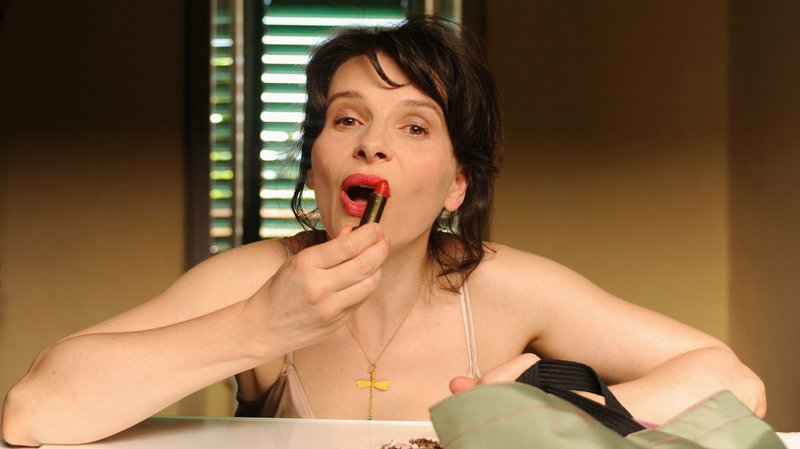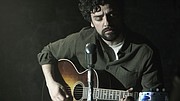It is curious to be a movie critic who doesn't like recommending movies to strangers.
But that's me. I don't know you, I don't know what you like. I love Ford v Ferrari, but I like internal combustion engines and Ray McKinnon. Your mileage may vary. Writing movie criticism isn't -- or at least shouldn't be -- consumer advice. We aim higher than that around here. Mostly.
Besides, I haven't convinced Karen to see Once Upon a Time ... in Hollywood. Not yet, anyway. So I'm dubious about my powers of persuasion. It's not my job to try to steer you to the movie theaters; it's my job to write something interesting about the movies I see. The job is performative as well as informative. You can make up your mind about how you want to spend your money.
Still, I thought about running a New York Times piece about the "best" movies of the rapidly closing decade this week. I respect the two critics, A.O. Scott and Manohla Dargis, who wrote the piece.
Then I started thinking about the way the world works, and how a lot of you who are interested in the movies have probably already read that piece or could read it with a few keystrokes. It would be lazy to run that piece, no matter how interesting I personally found it.
But it would be dishonest not to note that that piece was the genesis of this one. What they did was compile a list of the most "influential" movies of the past decade -- which, as they explained, aren't always the most popular or best-loved, but "the ones that shape the industry, reflect the times or change the terms of cultural discourse-- for better or worse."
They decided that the 10 most influential films of the 2010s were, in alphabetical order: American Sniper (2014), The Avengers (2012), Blackfish (2013), Bridesmaids (2011), Frozen (2013), Get Out (2017), The Hunger Games: Catching Fire (2013), Moonlight (2016), Okja (2017) and Star Wars: Episode VII -- The Force Awakens (2015).
We could quibble with that list, but it feels solid. These films all represent important cultural moments and/or exemplified significant trends in the industry and society. Most of you will be familiar with them. I liked half of them (you can guess which five) a lot and didn't have any major issues with the others.
Then came the more interesting part of the piece, as Dargis and Scott each presented a list of their 10 favorite movies of the decade. Which led me to compile a list of my 20 favorite movies of the 2010s. (Saying something is a "favorite" is not necessarily arguing for its superiority to other works, just an acknowledgment that it occupies a special place in the list-maker's heart. I have a much harder time handing down assessments of what's better and what's best.)
And here it is:
Ain't in It for My Health: A Film About Levon Helm (2013) -- Jacob Hatley's documentary seems designed to give those of us who didn't know Levon a sense of what it was like to spend informal time with him, puttering around his cluttered kitchen with his red plastic cup (into which he keeps pouring Coca-Cola). You'll know what was ordinary about Helm, as well as what was extraordinary -- the man was remarkably, thoroughly musical. And by the end of it, whether you knew him or not, you'll feel his loss.
Another Year (2010) -- It is difficult to boil Mike Leigh's Another Year down to a compelling story pitch. It's an intimate ensemble drama about a year in the life of a slightly daft yet remarkably centered London couple in the throes of late middle age. They are comfortably well-off, reliably liberal in their attitudes, and finally, deeply in love with each other. They are resigned to their happiness, confirmed in their serenity. Who would want to watch that movie?
Well, me for one. It is a bittersweet study of a happy family, its discontented satellites and the ways we sabotage ourselves.
Beasts of the Southern Wild (2012) -- Benh Zeitlin's film might prove to be one of those movies that opens up new avenues of delight for you, in that it shows a world familiar yet strange and fresh with extravagant human feeling. It is a hybrid of documentary and fantasy, a dystopian fable set in the fairly recent past that admits us to the secret life of an improbable but richly imagined society of souls.
Blaze (2018) -- Ethan Hawke's delicate film isn't really a bio-pic; it's not about Blaze Foley, although Foley (Little Rock native Ben Dickey) is a central character and you will find out a few things about the relatively obscure singer-songwriter by watching it. Blaze is about what you might have to give up if you want to live as an artist, if you're compelled to live as an artist. It's about the meager recompense of living the authentic life like a knight, like a monk.
Carol (2015) -- Todd Haynes' remarkable, intelligent and beautifully humane film evokes the smoky, poisonous beauty of early '50s America almost perfectly.
Certain Women (2016) -- Kelly Reichardt's movie is a different kind of modern Western; one where confrontations are deflected and firearms feel impotent. What matters about these stories is the Beckettian persistence of these women. They can't go on. They go on.
Certified Copy (2010) -- While not quite the first movie Iranian master Abbas Kiarostami shot outside his home country, it is the first chance most U.S. moviegoers had to see one of his films. It bears some of his trademarks -- long conversations in automobiles, philosophical investigation, a visit to a small town, a documentary style and a preoccupation with children. It is also an elliptical, unresolved story that may frustrate those who want all accounts balanced by the end of the day.
There is a twist in it I won't reveal, that will either irritate or delight you. For what it's worth, I liked it and felt that it was appropriate, intentionally provocative and well-earned. But I can understand if you think it a cheat.
First Reformed (2017)-- A comeback of sorts for Paul Schrader (Taxi Driver, Light Sleeper, American Gigolo), an artist who is equal parts philosopher and theologian as well as one of the original movie brats. Ethan Hawke plays Rev. Toller, minister of a dwindling church in upstate New York that has become more museum than organizing principle. After Toller fails (by his lights) one of his few remaining parishioners, a young woman named Mary (Amanda Seyfried), things turn bleak.
As Schrader has noted, there are some echoes of Robert Bresson's 1951 coolly emotive masterpiece The Diary of a Country Priest and Ingmar Bergman's Winter Light. Hawke's performance as another of God's lonely men demonstrates his maturation into one of our most committed and nuanced actors.
Inside Llewyn Davis (2013) -- If you know something about the Greenwich Village folk scene in 1961, and how the times are about to be a'changed, then your appreciation of this Coen Brothers gray comedy might resound a little deeper than the "funny, smart, sad" chord just described. Inside Llewyn Davis is a meditation on authenticity, the mystery of creation and the mischief that is made in the lands between art and commerce.
Kumiko, the Treasure Hunter (2014) -- David Zellner's Kumiko is a little art movie, and some of the dialogue is in Japanese. It is about a quest, with some elements of magical realism breaking in at the end. If you like movies that are highly explicit about what they are trying to tell you, you might be confounded by or disappointed in this movie. You might dismiss it as akin to one of those elliptical poems one sometimes encounters in the New Yorker, a glittering yet ultimately inconsequential bauble. You would not be wrong to think of it that way, for Kumiko has the oblique power of poetry in that it evokes the often incoherent phantoms of our interior life.
Leviathan (2014) -- Sober and deliberate, with the gray force of inevitability, Andrey Zvyagintsev's remarkably well-wrought film is a compelling drama set in contemporary Russia about a Job-like car mechanic who runs up against a crushing bureaucracy.
Manchester By the Sea (2016) -- A chance to vicariously experience the sadness of the saddest sort of man, to acknowledge the gray primer behind the bluest skies. Our life on earth is a contained thing, with a beginning and an ending, and even the dullest of us might imagine it has an arc, that it is moving toward something. What, we don't know. We can guess. We can hope.
Melancholia (2011) -- While I'm not a particular fan of Lars Von Trier's work, this is a devastatingly powerful film about how we are all going to die meaningless deaths and there's nothing we can do about it. It is a work of art, and like a poem, the best, most concise description of the movie may be the movie itself. Melancholia is to a large degree about its own articulation: the visual and linguistic grammar that it employs to convey itself.
Moonlight (2016) -- Barry Jenkins' coming-of-age story is a tough and beautiful film that one minute feels like Jean Genet transposed into the key of hard antiseptic sunshine before collapsing into a blue and lyrical Francois Truffautian night.
Once Upon a Time ... in Hollywood (2019) -- Perhaps not the best film of 2019, but it's the one I want to see again.
Take Shelter (2011) -- Just about any of Jeff Nichols' movies might qualify for this list -- I love Midnight Special more than most and believe the first five minutes of Loving should be taught in film schools. But for me, this is his most haunting and accomplished work, a movie of plausible horrors and tender moments, the sort of film that -- if you are susceptible -- can fill you up with inchoate feelings, unexplainable longings and phantom pains. It can make you hug those you love, and to shiver at the whispers of the secret sharer within.
The Tree of Life (2011) -- There are silly bits, maybe even points where Terrence Malick's earnest movie becomes risible, and the ending seems almost a like a sketch show's parody of art films, but it is simply terrific that such a beautifully souled man gets to make movies like this.
Under the Skin (2013) -- The classic movie that Jonathan Glazer's Under the Skin most reminds me of is Nicolas Roeg's The Man Who Fell to Earth (1976), although that's more for its elliptical storytelling than the similarities of plot. Like Roeg, Glazer shows rather than tells, with the aural cues provided mainly by Mica Levi's weird synth score. It's really no problem that the thick Glaswegian accents of some of the characters at first sound nearly indecipherable. This is how our world looks to fresh but fully adult (perhaps super-intelligent) eyes. This is the naked lunch William Burroughs was talking about.
Winter's Bone (2010) -- One of the first great movies of the decade introduced us to Jennifer Lawrence.
The Witch (2015) -- Robert Eggers' film ought not be consigned to any ghetto, not even one as popular and well-furbished as the American horror story. This is a significant film, wonderfully engineered to pollute one's sleep, that should be of interest to most people who enjoy sitting in the dark with strangers, sharing communal phantasms and nervous titters.
Email:
www.blooddirtangels.com
MovieStyle on 11/29/2019


